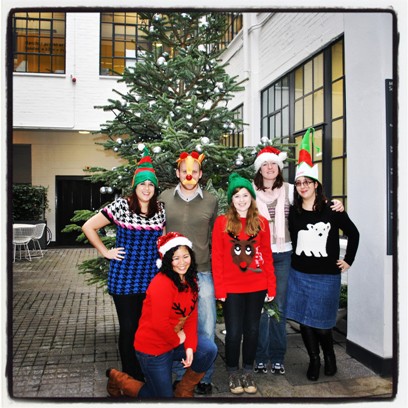The year in summary, and Happy Christmas from F1000Prime!
| 24 December, 2013 | Adie Chan |
|

|
This has been quite a year for us in F1000Prime. Our development team was kept very busy this year, helping us build and launch our new Journal Clubs feature, a new interactive and personalized homepage, and enabling us to ‘follow’ articles and Faculty Members, as well as nominate articles.
We launched a new initiative – F1000 Specialists – to allow people to become official representatives of F1000 and help us drive innovation in science publishing. We now have over 100 specialists and counting. F1000 Specialist activities led to us holding the first F1000 community meet-ups – three in 2013: in London, New York City and Heidelberg.
Two of our Faculty Members won Nobel Prizes – Michael Levitt and Randy Schekman – taking our Nobel winners total up to 9, our Chairman Vitek Tracz was featured in Science Magazine and labelled ‘The Seer of Science publishing’, and many other Faculty Members received prestigious awards, not limited to National Academy of Science memberships, Royal Society fellowships, and NIH pioneers. 59 of our Faculty were also on the highly influential biomedical researchers list.
We’ve announced new partnerships with PLOS, with Mendeley and the International Society for Computational Biology, and with Waldo. We signed DORA (the San Francisco Declaration on Research Assessment), and gave away prizes for best poster at conferences. We interviewed and added 18 new videos of the Faculty (see them all here) and, last but not least, we had some fun with a couple of science joke competitions on Twitter.
2013 has also seen us receive record numbers of submissions – the current total of published recommendations (at time of writing) is 149,762 – and we look forward to hitting (and celebrating) 150,000 published recommendations in 2014. We’ve had a great year – and we want to thank all our Faculty and Associate Faculty Members for helping us achieve all of this – without you, none of this would be possible.
To celebrate the great content we’ve posted on F1000Prime this year, below is a selection of our favourite quotes from recommendations by month.
From all of us at F1000, we wish you all a very happy Christmas and the very best of wishes for 2014.

JANUARY
…tools without ideas are a corpse; ideas without tools are a ghost.
Ferdinando Boero comments on an editorial piece that discusses how scientific progress is being driven by technological advancements rather than thought experiments, challenging the Kuhnian notion that scientific progress arises from abstract ideas that influence paradigm shifts.
FEBRUARY
In the post-genomic world, the best science is still often driven by ideas, rather than expensive equipment.
Faculty Member Lars Chittka commenting on the discovery published in Current Biology that Dung beetles use the Milky Way for orientation.
MARCH
The title gets one’s anticipations up for a ripsnorter of a controversy and the main text does not disappoint.
William Martin describes an article discussing the controversial ENCODE theory that more than 80% of the human genome is functional. The authors of the article label the theory “absurd”.
APRIL
What weapons do bacteria use for interspecies bacterial warfare?
Microbiology Faculty Member Drusilla Burns recommends an article in Nature that takes a look at a diverse family of phospholipases used by bacteria in intra- and interspecies conflict, with implications for novel antimicrobials and therapeutic targets.
MAY
Think you’re so special? Think again, suggests this short but thought-provoking review of the uniqueness (or not) of the human cortex.
Faculty Member Kent Berridge commenting on an article from Trends in Cognitive Sciences that debunks the myth of human exceptionalism.
JUNE
How do humans selectively attend to conversation with a relevant speaker while tuning out the irrelevant din of a noisy environment?
Jitendra Sharma muses over the neural basis of the ‘cocktail party effect’. The paper gives new insights into where in the brain the neural activity selectively enhances relevant speech when a listener attends to it.
JULY
…demonstrated the ability to generate substantial levels of electrical power from human perspiration…
Hak-Sung Kim on the use of epidermal biofuel cells in temporary transfer tattoos.
AUGUST
Does this parallel the observations in humans that some individuals gain weight rapidly, whilst others, like Jack Sprat, stay lean…?
F1000Prime Pharmacology Faculty Member David Triggle recommends a paper published in Science, where an international team examined the effects melanocortin receptors have on mammalian obesity.
SEPTEMBER
“kissing a smoker is like licking an ashtray”, yet the results of this study suggest adding an extra clause may be appropriate: ‘…or their door-frame, feature wall, window sill or refrigerator door’.
Philip Burcham highlights that toxicants from tobacco smoke deposit on walls and surfaces in smokers’ homes and, via skin contact, may pose a risk to those who live there.
OCTOBER
Coffee is the second most commonly consumed drink in the US (water is the first). Yet the health effects of usual coffee intake are unclear.
Eliseo Guallar recommends a commentary published in the Journal of the American College of Cardiology that reviews the evidence that exists on the association between habitual coffee consumption and cardiovascular risk.
NOVEMBER
I have never met such a biologist-friendly guide to molecular phylogenetics.
Shigehiro Kuraku highlights an editoral article published in BMC Evol Biol containing simple but universal tips for comparative biologists on how to conduct molecular phylogenetic analyses.
DECEMBER
By highlighting this study, I hope that, in the long run, the attitude towards ‘negative’ studies will become more positive.
Roland Seifert highlights an “an excellent example of a meaningful negative study”, namely one where many independent groups teamed up to test a clinically important hypothesis, only to come up with an important negative result that was carried through to peer review and publication.

|

![Christmas tree, By Lotus Head from Johannesburg, Gauteng, South Africa (https://www.sxc.hu/browse.phtml?f=view&id=223106) [GFDL (https://www.gnu.org/copyleft/fdl.html), CC-BY-SA-3.0 (https://creativecommons.org/licenses/by-sa/3.0/) or CC-BY-SA-2.5-2.0-1.0 (https://creativecommons.org/licenses/by-sa/2.5-2.0-1.0)], via Wikimedia Commons](https://blog.f1000.com/wp-content/uploads/2013/12/256px-Christmas_tree_sxc_hu1.jpg)
